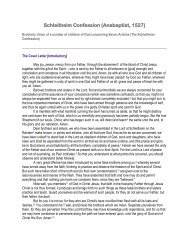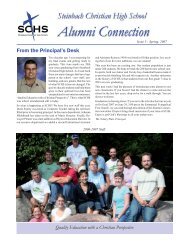MEXICO Drug war hits Mexico's Mennonites - schs
MEXICO Drug war hits Mexico's Mennonites - schs
MEXICO Drug war hits Mexico's Mennonites - schs
Create successful ePaper yourself
Turn your PDF publications into a flip-book with our unique Google optimized e-Paper software.
<strong>MEXICO</strong><br />
www.gameo.org<br />
“To the Ends of the Earth”: <strong>Mennonites</strong> in Central and South America: Resources<br />
Mexico<br />
Mennonite settlement in Mexico began in 1922, following the granting of a Privilegium<br />
(privileges) by the Mexican government under the leadership of President Alvaro<br />
Obregón. The Privilegium was similar to those extended to the <strong>Mennonites</strong> in Russia<br />
and elsewhere in Latin America. By 1927 some 7,000 Old Colony and Sommerfeld<br />
<strong>Mennonites</strong> from Manitoba and Saskatchewan were living in the Manitoba Colony<br />
(1922), Swift Current Colony (1922), and Santa Clara Colony (1922) in Chihuahua State;<br />
and at … the Hague Colony, in Durango State. These groups had emigrated from Russia<br />
to Canada in the 1870s in response to offers of reserved homestead lands and privileges<br />
and immunities equivalent to those inherent in the Privilegium held in Russia. When<br />
they perceived developments in Canada, especially the anglicization and secularization<br />
of the school system from 1916 on<strong>war</strong>d, as an invasion of these privileges and<br />
immunities, and as a threat to influence and authority by community leaders, they left<br />
Canada. Following a concerted search throughout North and South America, Mexico<br />
proved to be the only country besides Paraguay willing to accept them on their terms,<br />
and Mexico became the choice of all of the Old Colony <strong>Mennonites</strong> and a minority of<br />
Sommerfeld <strong>Mennonites</strong>.<br />
By 1940, despite the return to Canada of approximately 20 percent of the colonists [due<br />
to difficult farming conditions], and despite many deaths, especially of infants, the<br />
colonies needed more land. Since that time the <strong>Mennonites</strong> of Mexico have been<br />
continuously in search of land. While their numbers have increased almost 500 percent<br />
from 1940 to the late 1980s, to an estimated 45,000-50,000, their land holdings have<br />
increased by only slightly more than 100 percent. From 1948 to 1952, some 150 families<br />
(595 persons) of Kleine Gemeinde …affiliation from Manitoba established the<br />
Quellenkolonie (Quellen Colony) on 142 sq. km. … in Chihuaua…<br />
http://news.bbc.co.uk/go/pr/fr/-/2/hi/americas/8369200.stm<br />
Published: 2009/11/23 09:45:09 GMT<br />
<strong>Drug</strong> <strong>war</strong> <strong>hits</strong> <strong>Mexico's</strong> <strong>Mennonites</strong><br />
By Kate Joynes-Burgess Chihuahua state, Mexico<br />
<strong>Mexico's</strong> rampant drug-related violence is making headlines, with thousands of deaths<br />
linked to the turf <strong>war</strong>s this year. But while the focus is on urban centres like Ciudad<br />
Juarez, rural communities have also felt the effects first hand.<br />
"They have murdered Mennonite people… the drug-traffickers," says Abraham Peters, a
66-year-old retired rancher, who hails from the Protestant Mennonite sect in the<br />
agricultural heartland of Chihuahua state.<br />
“To the Ends of the Earth”: <strong>Mennonites</strong> in Central and South America: Resources<br />
Mexico<br />
Their parents and grandparents came to Mexico in the 1920s from Canada after being<br />
promised religious freedom in return for resurrecting farmland devastated during the<br />
Mexican revolution.<br />
Mr Peters' community is one of many caught in the crossfire as the federal government<br />
cracks down on the illegal drug trade.<br />
Despite the comfort provided by his religion, he admits feeling increasingly "unsettled"<br />
about his family's safety. "Years ago you never heard about executions," he ponders and<br />
tails off.<br />
Few members of his Church are talking about moving to Mennonite settlements in<br />
Belize and Paraguay as a result of the violence in Mexico, but the community is clearly<br />
concerned.<br />
The strain shows momentarily as Mr Peters rubs his forehead before pointedly adjusting<br />
his tall, cream cowboy hat, part of the trademark attire of Mennonite men that is a<br />
visual sign of the community's commitment to preserve its traditions.<br />
His dark blue dungarees, originally inspired by the uniforms of Mexican railway workers<br />
observed on that momentous journey down from Canada, bear a large pocket at the<br />
front.<br />
From it he pulls out a map and points to the place where drug gangs reportedly killed a<br />
Mennonite man in Cuauhtemoc and another, closer to home, in the farming corridor<br />
outside the city's commercial hub earlier this year.<br />
Putting down roots<br />
Mr Peters looks wistfully upon his immaculate yet modest family home, flanked by<br />
waving cornfields. For him, this farmhouse, within the largest cluster of Mennonite<br />
colonies in Mexico, is more than bricks and mortar.<br />
It is the only home he has ever known, where he has worked the land and raised cattle<br />
since boyhood.<br />
Built by his father, Isidro - a first generation Mennonite migrant from Canada's<br />
Saskatchewan province - the house is also Mr Peters' birthplace, where he still lives with<br />
wife, Catarina, and Maria, the youngest of their eight children.<br />
All speak the Low German or Plautdietsch language of their forebears, and only the men<br />
learn Spanish.
“To the Ends of the Earth”: <strong>Mennonites</strong> in Central and South America: Resources<br />
Mexico<br />
Two of his sons have taken over the family farming business in Cuauhtemoc, where they<br />
are already training up the next generation. Others have purchased agricultural land in<br />
Mennonite settlements in the north of Chihuahua.<br />
Putting down roots is rare in Mennonite history, which has been punctuated by periodic<br />
mass migration.<br />
Originating in the Netherlands, these followers of 16th Century Anabaptist Menno<br />
Simons, a radical Protestant reformer, relocated to Russia in the 1770s and then to<br />
Canada in the late 19th Century.<br />
They fled persecution for their refusal to participate in military action or swap their<br />
Germanic dialect for the host language.<br />
A 7,000-strong community moved to Mexico between 1922 and 1927 after negotiating<br />
temporary fiscal benefits, autonomy over education in their mother tongue and<br />
exemption from military service.<br />
Economic success<br />
Since then their numbers have swelled to some 60,000 in Chihuahua's 25 Mennonite<br />
colonies, while smaller settlements are found in Durango, Campeche, Zacatecas and<br />
Tamaulipas.<br />
Unlike fellow Anabaptists the Pennsylvania Amish, Mexican <strong>Mennonites</strong> have steadily<br />
modernised agricultural techniques in response to the harsh realities of their<br />
environment, where drought is a regular threat.<br />
Authorities estimate Mennonite farmers account for at least 60% of the state's<br />
agricultural produce, supplying staples such as corn and beans. Nicknamed<br />
"vendequesos" or "cheese-sellers," <strong>Mennonites</strong> make 80% of the region's cheese and<br />
some 70% of its dairy produce.<br />
Since <strong>Mexico's</strong> financial crisis of 1994, they have invested collectively in an exclusive<br />
credit union where only Mennonite shareholders are permitted. By safeguarding access<br />
to credit, the community has managed to partially insulate itself from the global<br />
financial crisis. Good harvests in 2008 and 2009 have also helped.<br />
But these economic achievements have attracted the attention of organised criminal<br />
gangs, putting <strong>Mennonites</strong> at risk of armed robbery, kidnap and extortion.<br />
Katharine Rempenning, director of the state government's Mennonite Outreach<br />
Programme, dismissed talk of any mass exodus over fear of violent crime, but admitted<br />
some members of the community "were thinking of leaving Mexico".<br />
Crime prevention
Chihuahua's minority Christian groups are still reeling from the 7 July murder of<br />
Mormon anti-crime activist Benjamin LeBaron, and his neighbour Luis Widmar.<br />
“To the Ends of the Earth”: <strong>Mennonites</strong> in Central and South America: Resources<br />
Mexico<br />
Mr LeBaron rose to prominence after his own brother was abducted in May this year.<br />
Mennonite groups joined Mr LeBaron's peaceful protests against a wave of kidnappings<br />
affecting both communities.<br />
Ms Rempenning, a Mennonite of Russian extraction, is concerned that her community's<br />
culture of being "open to others" makes members more vulnerable to becoming victims<br />
of crime.<br />
Giving advice on crime prevention - "most importantly, kidnapping" - is a priority for her<br />
department, which has an annual budget of 500,000 pesos (US $38,258).<br />
Meanwhile, Mr Peters suggests some threats to Mennonite values are coming from<br />
within.<br />
"There are <strong>Mennonites</strong> involved in the drug [trade]… in distribution," he alleges.<br />
Uncertain future<br />
While Cuauhtemoc is one of <strong>Mexico's</strong> fastest growing urban centres, there is also sense<br />
of abandonment.<br />
Mr Peters, who in his retirement has been taking tourists around Mennonite country,<br />
says he has hardly received any overseas visitors this year because of security fears,<br />
compounded by the H1N1 swine flu outbreak in April.<br />
Busloads of Canadians and Americans no longer visit the city's Mennonite Museum for<br />
the same reasons.<br />
"We don't know what future awaits us," Mr Peters states with a tone of acceptance.<br />
"Only God knows."<br />
But for this Mennonite at least, his future is in the land of his birth. "We are Mexican<br />
now," he proclaims as he clasps his hands together for emphasis. "Mexicans and<br />
<strong>Mennonites</strong> are like this!"<br />
"We don't know what God wants with Mexico… but yes, we will stay, yes we are going<br />
to pray very much and come together."<br />
This peaceful religious community could be facing its biggest test yet.

















